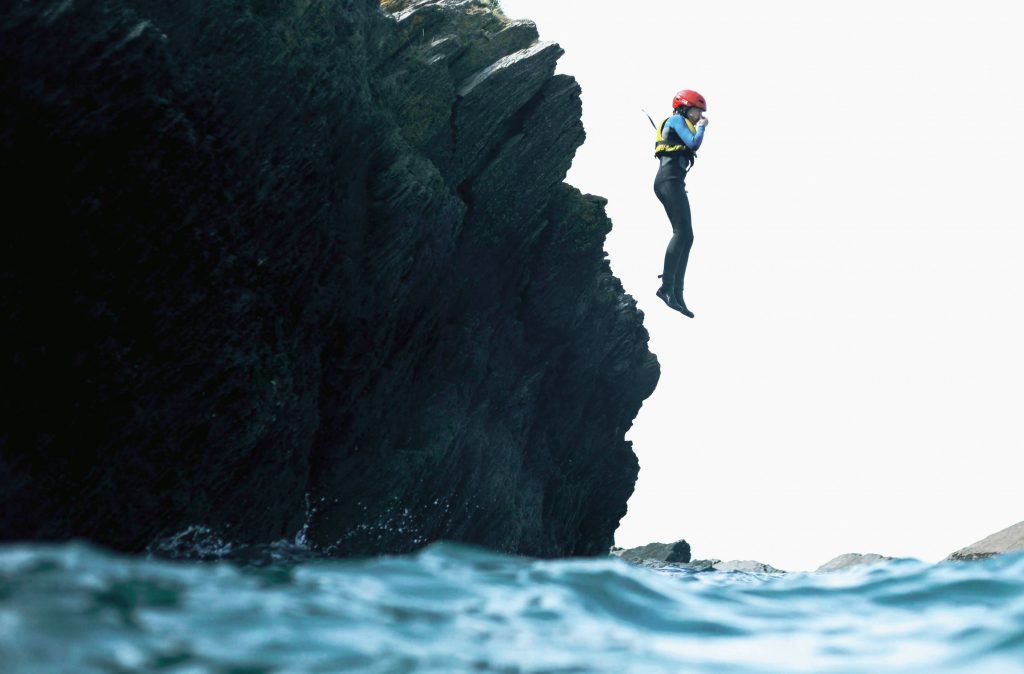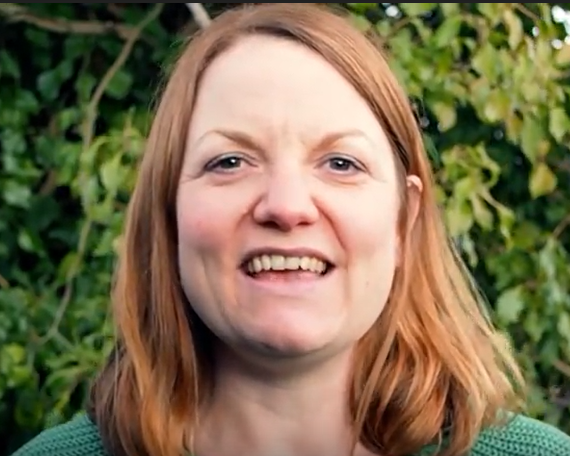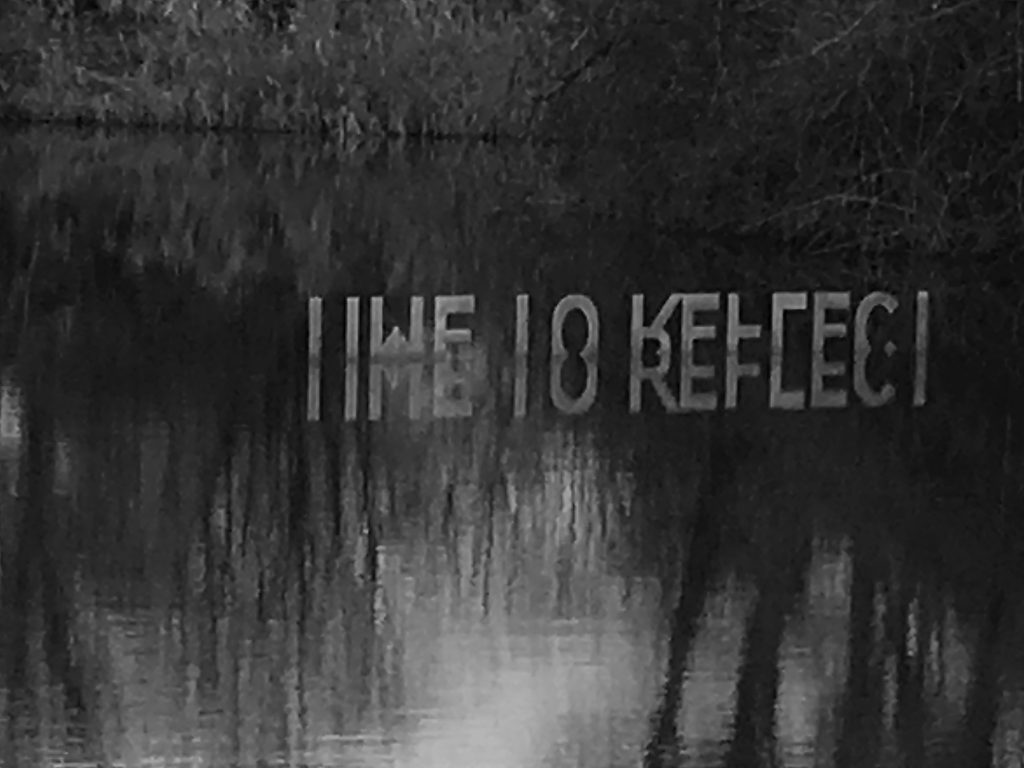What do you do when you don’t know what do to?
Maybe it is more about recognising the “stuck” feeling and figuring out HOW to find out…

What do you do when you don’t know what do to?
Maybe it is more about recognising the “stuck” feeling and figuring out HOW to find out…

I have a really strong memory of my association with failure. I had read about coasteering, and it sounded fun. I don’t really do detail, so didn’t see the finer points like, how high you actually are when you jump into the sea off a cliff face…
“He who is not courageous enough to take risks will accomplish nothing in life”
Muhammad Ali
Having convinced a relatively new friend to take advantage of a cheap trip to Cornwall and “sold” her the merits of coasteering (as I saw them), we found ourselves by the coast, in wetsuits, having our briefing on the activity.

We were promptly turned to face the water for our first jump. The first punch in the stomach was how far up we were. Surely we were going to work up to the “big” ones, I remember musing quietly. I was pretty easy going about it though, and was excited to “jump”.
My friend chose to go first, and on approaching the edge became jittery and jelly legged. As the on-looker I chuckled, wondering what was so difficult. The way she was dancing about made it look like she needed the loo! After much encouragement, she finally jumps. She’s in the sea down below, beaming. Its my turn next.
Filled with energy, not a glimmer of fear I step towards the edge. Only, when I take the final step to the edge and look down, I felt the blood physically drain from every part. Brain says “no way”. Legs feel like they’ve detached themselves. The question is, will they even bend so I can jump and propel over the edge!
I don’t even have the “you’ll feel amazing after” – I literally froze but wanted to run away. My friend is bobbing around in the water below, and sees what I saw in her, moments earlier. “Come on” she shouts. I can barely hear. She repeats. I remain.
THEN, she shouts “come on Sheela, you never fail at anything”.
She’d barely finished her sentence, and I was off. I plunge into the water, my eyes squeezed so tightly shut so I didn’t lose my contact lenses! I’m so deep now, I start to wonder if I’ll make it back up (and various other expletives).
I do rise. I am alive. I give them the “OK” sign and the rush of awesomeness rushes through me. I did it!
My reputation for pushing through things untarnished, but oh man that was at the edge of the limits.
We did a few more jumps that day, and the thrill of the jump didn’t always erase the fear of anticipation, which I found really curious. Would I do it again? The jury is out but I learnt from it.
I found that no, I don’t fail at things. They might turn out a bit different to what I expected, but I find a way to get myself through, and see the incredible on the other side. I think it comes down to your definition of failure and whether its final or dynamic.
So, to business, and the business of life! Failing IS an option, some would say its an imperative. If we don’t consider it, then it will slap us in the face when we’re least expecting it. Plan for it, and you’ve got the upper hand.
“I have not failed, I have just found 1000 ways that did not work”
Thomas. A. Edison
What are you going to do if your business (or maybe something in “life”) fails?
This might seem like a funny question to lead in with, but looking at contingency plans at the start has multiple benefits. You plan for your car to fail you, by carrying a spare wheel, so what stops you applying that logic to other things? Here’s some angles to take a view from:
“A person who never made a mistake never tried anything new”.
Albert Einstein

Another anecdote. I’m 18, working my summer to get ready to head off to University in the autumn. I’d booked the day off my waitressing job to go and get my exam results. On entering the gym hall, scouring the walls full of pages of results proved futile, so I head for my “envelope”.
The paper did not contain the letters I had hoped for. Its funny how significant that moment was, a few letters on a piece of paper, yet now I struggle to remember what they were! The memory is that I didn’t get the distinctions (A’s) I was predicted.
I remember that with clarity. Standing in the hall, time froze, like the world had ended. I had PASSED the exams, I just hadn’t done as well I was hoping/predicted to achieve. The repercussions of this (in my watery eyes at the time) were incomprehensible.
What I did know (and was circling in my mind), were that the grades would have been good enough to attend the University I really DID want to go to (but was steered away from by school, for fear it was not prestigious enough). I did not apply there (on this very advice), so this was not an option now (internal anger increasing).
I can’t really remember much after that moment, except getting offered a slightly different course (which didn’t appeal), a friend offering to take me for a trip to her old university where they had clearing places and on worrying about “missing the boat” a conversation with my mum which went something like “if you take a year out, I will make it so painful for you, you will be running off to university next year”.
…I went with my friend and found a flexible course option which suited my interests. I had a wonderful time, learnt lots, met great people of course now do something totally different to that marketing degree! I am still alive, and the world did not end that day.
Those “different” results, which could have been construed as failure, forced me to make different choices, that were my own, thus exposing me to a variety of people, situations and experiences, that I wouldn’t have had otherwise. I am truly thankful for that.
I made it a success, and having to take that decision at that age, taught me early on that making my own choices when faced with “failure”, or just making my own choices full stop, means I am in control, so I decide what success and failure actually are.
What is the middle ground between failure and success? Where does one stop and the other begin? The early education “systems” we operated in tell us we can pass, merit, or maybe the elusive distinction and yet a fail is a fail, the end. In your business, do you have levels of success or failure?
Do you separate out where you want to be, for example what is your line in the sand on what failing or succeeding actually means? What does “break-even” look like (is that your equivalent of a pass?), so then, what would a merit or distinction look like? Would you be measuring financially, audience, clients or something else?
“Thought Provocateur” is the description I have of myself, because I help people see things from a different perspective. I hope I have done that here, and look forward to your comments and insights. Maybe you have a further perspective to offer? I’d love to hear it – lets talk soon!
Want to take up the challenge of coasteering? Check out the many places you can do it in the UK here.

Sheela Hobden is a Coach at bluegreen Coaching. Following her own mental health battles, she now coaches individuals, runs training sessions and speaks at conferences. She has a real passion for helping medics and healthcare professionals take as much care of themselves as they do their patients in whatever life or career conundrums they face! She is also a Mentor Coach and Coach Supervisor. She has a PGCERT in Business and Personal Coaching, holds PCC member status with the ICF and is CIPD qualified. She challenges herself with ultra distance running and Ironman. Find her at www.bluegreencoaching.com or swimming in the sea, in Poole, Dorset
Get more ideas and tips by joining her newsletter tribe – sign up below!
Better still, book in to speak with her directly?


What a glorious spring day! I decided to take to my bike.
I am lucky enough to live on the south coast, so a short trip over on the Sandbanks ferry puts me en route to Swanage.
The Purbeck views continue to impress me.
After the climb out of Studland, I sail down into the town itself, steering round the back so I can take in the length of the prom and spot the chip eaters, ice-cream lickers and paddlers on the beach.
As I breeze along, I spot a couple of people in running gear shuffling along with walking poles, then another, then more, like a trail of ants. I notice an orange label on their back, and realise what it is.
These people were taking part in the Jurassic Coast Challenge. This is a three day, three marathon, trail run event following the South West Coast Path. Being in Swanage, I know its the final day. This explains the struggle of a march! I see another and shout “Well Done Jurassic, keep going!” – a half smile meets me!
That point is nearly six miles from the finish – so close to home, not much is functioning any more! how do I know this? Because that was me, 3 years ago. I know EXACTLY how they could be feeling!
I started pushing then, on my bike, up the hill back over the Purbecks.
My mind started whirring; how I was now on the bike rather than running, moving faster, putting in spurts of efforts on the climbs, but taking in more of the views on the way down, rather than “head down lets finish this”. The life I led back then was also very much just that; “keep your head down and carry on”.
My revelation was a reflection on how life has changed. Completing that challenge taught me so much. Mental toughness, endurance skills as well as the physical fitness I had built. I’m not saying now is all smooth and rosy now, its very much like the ride, some hard effort chunks, followed by some respite of the other sides of the hills!
I would say though, that today, I was much more in control on my ride, I had choice over my route, how long I stayed out soaking up the sun and whether I chose to stop for a break. Feels very much how I work now. I’m cycling in the middle of the day, because I can, I chose this lifestyle and made it happen.
As we settle into any new “normal”, it can be very easy to forget the challenges we’ve achieved and overcome, see what we learnt from them as well as the new options it creates for us.
In sharing today’s experience, I hope to encourage others to take the opportunity and benefit from the “power tool” that is reflection!
What has changed for you over the last 3 years?
If there’s changes that you want that haven’t happened, where could you start?
Small things lead to cumulative big change…if you want it!

Sheela Hobden is a Coach at bluegreen Coaching. Following her own mental health battles, she now coaches individuals, runs training sessions and speaks at conferences. She has a real passion for helping medics and healthcare professionals take as much care of themselves as they do their patients in whatever life or career conundrums they face! She is also a Mentor Coach and Coach Supervisor. She has a PGCERT in Business and Personal Coaching, holds PCC member status with the ICF and is CIPD qualified. She challenges herself with ultra distance running and Ironman. Find her at www.bluegreencoaching.com or swimming in the sea, in Poole, Dorset
Get more ideas and tips by joining her newsletter tribe – sign up below!
Better still, book in to speak with her directly?